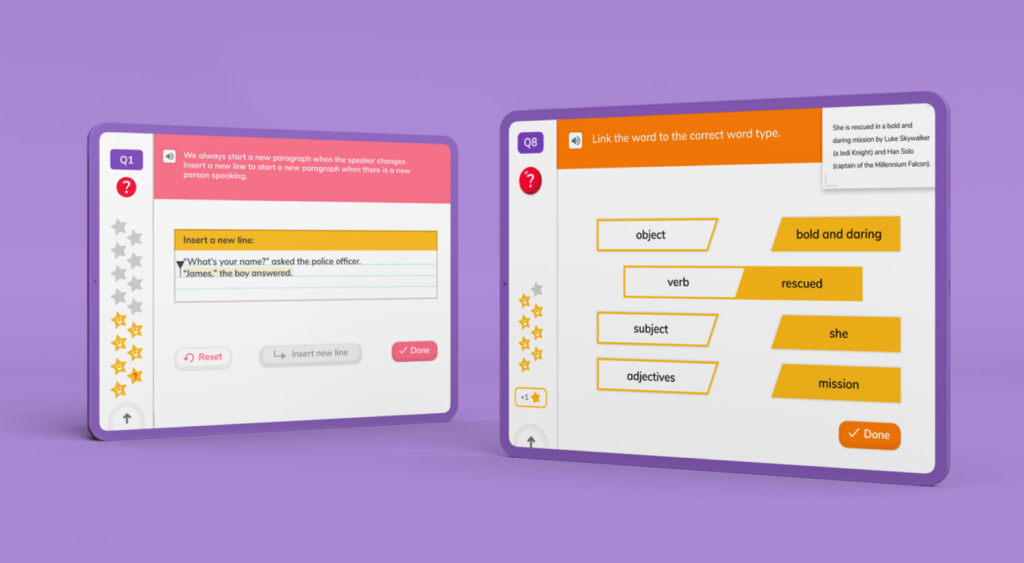

Learn what’s taught in the Key Stage 2 English Curriculum across the subjects of reading, comprehension, writing, composition & grammar.

Author
Mhairi Sim
Published
August 2024


Learn what’s taught in the Key Stage 2 English Curriculum across the subjects of reading, comprehension, writing, composition & grammar.

Author
Mhairi Sim
Published
August 2024


Learn what’s taught in the Key Stage 2 English Curriculum across the subjects of reading, comprehension, writing, composition & grammar.

Author
Mhairi Sim
Published
August 2024


Key takeaways
Table of contents
The KS2 English curriculum covers learners in primary school from Year 3 to Year 6. The KS2 English national curriculum is split into two stages–lower Key Stage 2 for Years 3 and 4, and upper Key Stage 2 for Years 5 and 6.
In each year group students will cover the same aspects of reading, writing, and spoken language. In reading they’ll explore word reading and comprehension. In writing, they’ll learn skills across transcription (spelling and handwriting), composition, and vocabulary, grammar, and punctuation.
As per the English national curriculum KS2, students in Years 3 and 4 will follow the lower KS2 curriculum. This is a singular curriculum for both years that they’ll aim to be achieving by the end of Year 4.
Across years 3 and 4 learners should be able to read new texts fairly easily. They should be able to sound out almost all words and figure out the meanings of new words. They’re able to do this by using context clues and their knowledge of root words, prefixes, and suffixes.
In the lower KS2 English curriculum, students will broaden their range of reading materials and learn how to identify the key ideas in a text. A key difference at this stage is that they are expected to back up any answers or discussion points with evidence from the text.
Unlock unlimited English questions
Put your skills to the test with fun exercises + learning games that are proven to boost ability!
KS2 students will learn spelling rules for prefixes,suffixes, homophones, and commonly misspelled words. In addition to this, they’ll be shown how to use a dictionary to check spellings for themselves!
In lower KS2 English, students focus more on how to structure their own writing. Depending on what they are writing they’ll need to consider aspects like text structure, plot lines, character development, and more.
In Years 3 and 4, students will turn their attention to vocabulary, grammar, and punctuation, Specifically, how it can be used to enhance their writing and improve clarity!
Using elements such as nouns and/or pronouns to avoid repetition, conjunctions, prepositions, and adverbs will all be a part of their toolkit by the end of Year 4. They’ll also learn how to incorporate direct speech into their work with the correct use of speech marks.
DoodleEnglish is an app that’s filled with thousands of fun, interactive exercises covering grammar, punctuation, spelling and more!
Designed by teachers, it creates each child a unique work programme tailored to their needs, boosting their confidence and skills in English. Try it for free today!

The other half of the KS2 English national curriculum students will work through when they get to Year 5 and Year 6. Known as the upper KS2 English curriculum, these are the final years kiddos will complete in their primary school education, so it goes without saying – this is an important stage!
There are really no new skills to be learned in word reading for our seasoned Year 5 and Year 6 students! Instead, they’ll continue to use their knowledge of root words, suffixes and prefixes to help them determine the meaning of unfamiliar words.
Learners will learn how to establish facts from opinions, discuss examples of figurative language, and explore different types of writing such as persuasive writing.
They’ll continue to develop their reading skills as they:
In addition to all this, they’ll almost always be asked to back up their points of view with evidence from the text they’ve read.
By this point in the English KS2 national curriculum, it’s not surprising that there are new skills to be learned in transcription. Students will continue to expand their knowledge of prefixes, suffixes and homophones.
It’s likely they’ll still follow a spelling programme and use a thesaurus to look up synonyms.
A large focus of writing composition for our Year 5 and 6 students will focus on the three stages of writing.
Throughout the upper KS2 English curriculum, learners are expected to have knowledge of perfect verb form, expanded noun phrases, modal verbs, adverbs, and relative clauses (e.g. those beginning with who, which, when, where, and so on). They’ll also be well-versed in the proper use of punctuation.
The spoken language curriculum is the same across all year groups of the English national curriculum. The guidance for teachers is, that it’s up to them to teach the various aspects of the programme in a way that is suitable for their learners at their age and stage.
KS2 learners will have the opportunity to build their spoken language skills in a variety of ways, some of which are:
There are a few KS2 assessments to be aware of if you have a learner working their way through this stage. While schools may schedule their own informal assessments, two official exams are on the horizon for most Year 6 students.
As part of the national KS2 English curriculum, student’s skills are put to the test in the KS2 English SATs, which are a part of the larger end-of-KS2 SATs assessment programme.
These are statutory assessments, which means that all Year 6 students must take part in the examination in June.
The 11 Plus exam is slightly different in that these exams are only completed by students who wish to apply to academically selective secondary schools. These exams will cover much of what is taught in the English KS2 national curriculum, and in some cases may go beyond!
It’s worth noting that it’s up to individual schools to source the test materials for their 11+ exams. This means that some schools may make up their own assessments while others use a third-party test provider.
As they work through the national curriculum for English, KS2 students can benefit from extra practice along the way. My main recommendation as a teacher to boost English skills across the board is to get kids reading!
Encourage your kiddos to pick up a book at least once a day and spend time reading. You can make this fun by reading bingo boards, reading reward charts, or even something like this reading reflection record.
It’s also important to get them to see the practicality in writing to keep them motivated. For creative kids, challenge them to write a storybook, play writing-based games like ‘Stop the Bus’, or pick up story dice as a creative prompt. For the more practical kids, try functional writing tasks like writing out shopping lists, filling in the family calendar, or getting them a pen pal!
You can also create a free DoodleEnglish account for your child where they can play a variety of interactive games designed to boost their English skills! The app is fully aligned with the English national curriculum and will give each user their very own programme of work.
As their time at primary school draws closer, there is a lot to pack into these two busy years! Try using some of our tips above to help your kiddos get in that extra English practice as they navigate the Year 5 and Year 6 KS2 English curriculum.
We’re sure that when the time comes they’ll be more than ready for all secondary school has to throw at them!
Book a chat with our team
If you’d like to use Doodle’s browser version, please visit this page on a desktop.
To log in to Doodle on this device, you can do so through our apps. You can find out how to download them here: